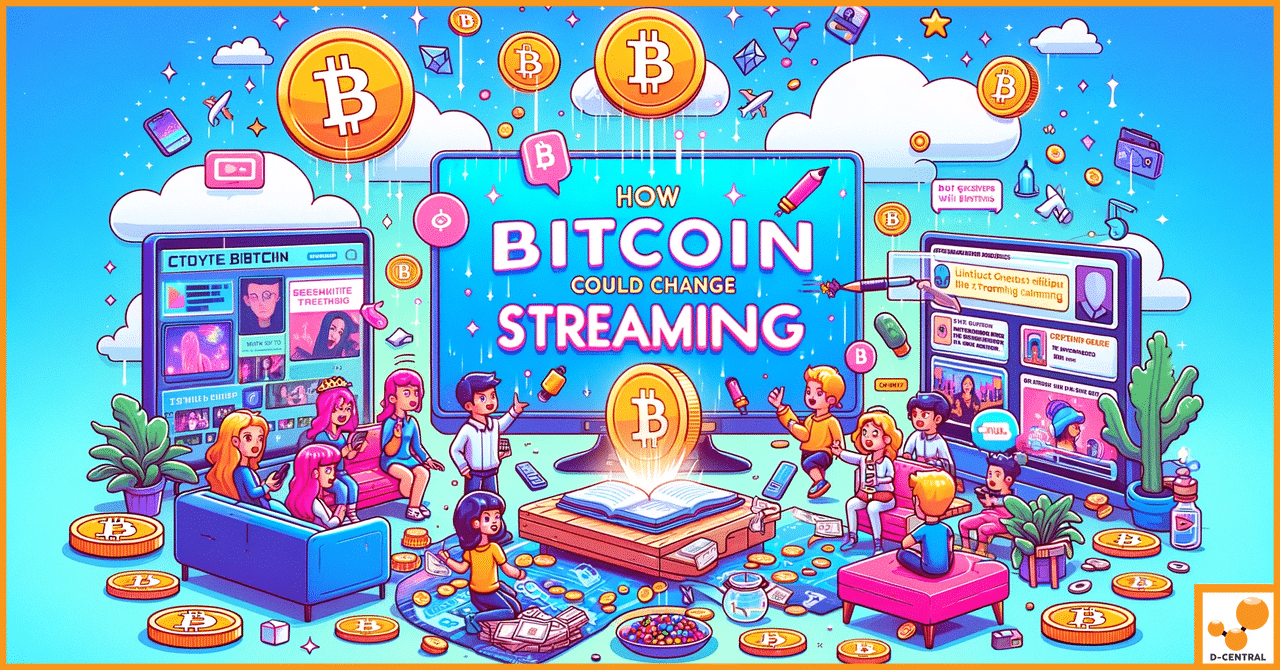
Transforming Bitcoin’s Thermal Byproduct: A Win-Win for Miners and Warehouses
Bitcoin mining is a cornerstone of the cryptocurrency ecosystem, fueling the operation and security of Bitcoin, the most recognized digital
4479 Desserte Nord Autoroute 440, Laval, QC H7P 6E2

In today’s digital age, streaming services have become the cornerstone of entertainment, offering an unprecedented library of movies, TV shows, music, and more at our fingertips. This convenience, however, comes with its own set of challenges. The current streaming landscape is fraught with issues such as content piracy, unfair revenue distribution, and geographical restrictions, which not only hinder the growth of the industry but also affect the creators and consumers alike. Moreover, the centralization of streaming platforms has led to a monopolistic control over what content gets distributed and how revenue is shared, leaving many content creators at a disadvantage.
Enter Bitcoin and blockchain technology, heralded not just as financial innovations but as foundational technologies that have the potential to redefine a multitude of industries, including streaming. At its core, Bitcoin offers a decentralized payment system, while blockchain technology provides a secure, transparent, and immutable ledger. Together, they propose a new paradigm for the streaming industry—one where content distribution is democratized, creators are fairly compensated, and consumers enjoy a more personalized and unrestricted access to content.
This article aims to explore the transformative impact of Bitcoin and blockchain on the streaming industry. By addressing the current challenges through the lens of these technologies, we will delve into how they can not only solve existing problems but also unlock new opportunities for creators and consumers, paving the way for a more equitable, efficient, and accessible streaming ecosystem.
Bitcoin, the world’s first decentralized digital currency, was introduced in a 2008 white paper by an individual or group of individuals under the pseudonym Satoshi Nakamoto. The primary motivation behind Bitcoin was to create a peer-to-peer electronic cash system that operates without the need for a central authority. This revolutionary idea was not just about creating a new form of currency but also about establishing a system where transactions could be securely and transparently recorded without the need for intermediaries such as banks.
Bitcoin operates on a decentralized network of computers (nodes) that validate and record transactions on a public ledger known as the blockchain. The principles of Bitcoin are rooted in cryptography, which ensures the security and integrity of transactions. Additionally, Bitcoin introduced the concept of mining, a process where computers solve complex mathematical problems to validate transactions and are rewarded with newly minted bitcoins. This not only secures the network but also introduces new bitcoins into the system in a controlled manner, mimicking the extraction of precious metals (hence the term “mining”).
How Bitcoin Differs from Traditional Currencies
Unlike traditional currencies, which are issued and regulated by governments and central banks, Bitcoin is decentralized and operates on a peer-to-peer network. This means there is no central authority that controls the supply or value of Bitcoin. Its value is determined by supply and demand dynamics within the network of users. Furthermore, Bitcoin transactions are irreversible, providing a higher level of security against fraud compared to traditional payment methods. Another key difference is the transparency and immutability of the Bitcoin blockchain, which allows anyone to verify transactions and ensures that once a transaction is recorded, it cannot be altered or deleted.
Definition and Workings of Blockchain Technology
Blockchain technology is the underlying infrastructure that supports Bitcoin and many other cryptocurrencies. At its simplest, a blockchain is a distributed ledger or database that is shared among the nodes of a computer network. It stores information in blocks that are linked together in a chain. Each block contains a number of transactions, and once a block is filled, it is closed and linked to the previously filled block, forming a chain of blocks or a “blockchain.”
One of the key features of blockchain technology is its decentralized nature. Instead of being stored in a single location or managed by a single entity, copies of the blockchain are held across a network of computers, making it highly resistant to tampering or control by any single entity. Transactions on a blockchain are secured using cryptography, and before new transactions can be added to the blockchain, they must be verified by the network through a consensus mechanism, such as proof of work or proof of stake.
Importance of Blockchain in Securing Transactions and Data
Blockchain technology’s importance lies in its ability to provide a secure, transparent, and immutable record of transactions. The cryptographic underpinnings ensure that transactions are secure and that each participant’s identity can be verified through digital signatures. The decentralized and immutable nature of the blockchain means that once a transaction is recorded, it cannot be altered or deleted, providing a verifiable and permanent record. This is crucial for building trust in a system where parties do not need to rely on a central authority to guarantee the integrity of transactions. Furthermore, blockchain’s transparency allows all participants to view transaction histories, fostering a level of openness and accountability that is often lacking in traditional systems.
The streaming industry, despite its rapid growth and popularity, faces several significant challenges that threaten its sustainability and fairness. These challenges include content piracy, royalty distribution, and platform centralization, each of which presents unique obstacles for creators, consumers, and platforms alike.
Content Piracy: One of the most persistent issues in the streaming industry is content piracy. With the ease of accessing and sharing digital content, piracy has become rampant, significantly impacting the revenue streams of content creators and rights holders. Pirated content undermines the value of legitimate subscriptions, leading to financial losses for both creators and platforms.
Royalty Distribution: The current models for royalty distribution in the streaming industry are often criticized for their lack of transparency and fairness. Many content creators, especially independent artists and smaller production companies, find it challenging to receive fair compensation for their work. The opacity of royalty calculations and the small fractions of revenue that actually reach the creators have sparked widespread debate and dissatisfaction.
Platform Centralization: The streaming market is dominated by a few major platforms, leading to a high degree of centralization. This concentration of power results in a lack of competition, which can stifle innovation and limit choices for consumers. Additionally, the centralized control over content distribution and monetization gives these platforms undue influence over which content is promoted and how revenue is shared, often to the detriment of smaller creators.
The limitations of traditional payment systems in the streaming industry further exacerbate the challenges faced by content creators and consumers. These systems, which include subscription fees, pay-per-view charges, and advertising revenue, have several drawbacks that affect the overall efficiency and fairness of the streaming ecosystem.
High Transaction Costs: Traditional payment systems often involve intermediaries, such as payment processors and banks, which can lead to high transaction fees. These costs are either absorbed by the platforms (reducing their profitability) or passed on to consumers, making access to content more expensive.
Delayed Payouts: Content creators frequently experience delays in receiving payments due to the lengthy processing times associated with traditional financial systems. These delays can pose significant financial challenges, especially for independent creators who rely on timely payments for their livelihood.
Lack of Microtransaction Support: Many traditional payment systems are not well-suited for microtransactions, which are small financial transactions often deemed necessary for a more flexible and fair content monetization model. The inability to efficiently process microtransactions limits the potential for innovative monetization strategies, such as micropayments for individual pieces of content or tips for creators.
Geographical Restrictions: Traditional payment systems are often bound by national borders and currency differences, which can complicate international transactions. This not only restricts the global reach of streaming platforms and creators but also limits access for consumers in different regions.
Together, these challenges and limitations highlight the need for innovative solutions that can address the issues of content piracy, unfair royalty distribution, platform centralization, and the inefficiencies of traditional payment systems. Bitcoin and blockchain technology emerge as promising candidates to overcome these obstacles, offering a new paradigm for the streaming industry that prioritizes security, transparency, and fairness.
Bitcoin, at its core, facilitates decentralized transactions without the need for a central authority. This principle can be extended to the streaming industry through the adoption of a peer-to-peer (P2P) content distribution model. By leveraging Bitcoin and its underlying blockchain technology, content creators can directly distribute their work to consumers, bypassing traditional centralized platforms. This model not only reduces dependency on major streaming services but also ensures that a larger portion of revenue goes directly to the creators.
Case Studies or Theoretical Models of Bitcoin in Streaming
One theoretical model of Bitcoin in streaming involves the use of “streaming sats” (satoshis, the smallest unit of Bitcoin), where viewers can pay creators in real-time for the content they consume using layer 2 technologies like the Lightning Network. This technology enables instant, high-volume microtransactions with minimal fees, making it feasible for viewers to pay small amounts of money per minute or per view, directly supporting the creators. Although still in its infancy, this model promises a revolutionary shift in how content is monetized and distributed.
Exploring Bitcoin Payment Models: Microtransactions, Pay-Per-View
The integration of Bitcoin into the streaming industry introduces innovative payment models such as microtransactions and pay-per-view, tailored to the digital age. Microtransactions allow consumers to make small payments for accessing individual pieces of content, offering a flexible and fair way to support creators. Pay-per-view, on the other hand, can be reimagined with Bitcoin, allowing for direct transactions between viewers and creators for exclusive access to live events or premium content.
The Potential for Smart Contracts in Automating Royalty Payments
Blockchain technology, which underpins Bitcoin, enables the use of smart contracts – self-executing contracts with the terms of the agreement directly written into code. In the context of streaming, smart contracts can automate royalty payments, ensuring that creators are compensated fairly and transparently based on predefined criteria, such as viewership numbers or subscription levels. This automation reduces administrative overhead and disputes over payments, creating a more sustainable ecosystem for content creation and distribution.
The Role of Blockchain in Providing Global Access to Content
Blockchain technology inherently supports global transactions without the need for intermediaries, making it an ideal solution for overcoming geographic restrictions in the streaming industry. By utilizing blockchain, content can be distributed on a global scale without the limitations imposed by traditional payment systems and licensing agreements. This democratizes access to content, allowing creators to reach a worldwide audience and consumers to access a diverse range of content regardless of their location.
Examples of Blockchain-Based Streaming Platforms
Several blockchain-based streaming platforms are emerging, showcasing the potential of this technology in transforming the industry. Platforms like Theta Network and Livepeer are pioneering decentralized video streaming, offering an infrastructure that rewards users for sharing their spare bandwidth and computational resources. These platforms not only provide global access to content but also introduce innovative ways to incentivize and compensate all participants in the ecosystem, from creators to viewers and network contributors.
By leveraging Bitcoin and blockchain technology, the streaming industry can address its current challenges, offering a more equitable, efficient, and accessible model for content distribution and monetization. The concepts of streaming sats and the use of layer 2 technologies represent just the beginning of this transformative journey.
The exploration of Bitcoin and blockchain technology in the context of the streaming industry reveals a future brimming with potential for revolutionizing how content is distributed, accessed, and monetized. By harnessing the power of decentralized technologies, the streaming sector stands on the cusp of a transformative shift that promises to address longstanding challenges such as unfair royalty distribution, content piracy, platform centralization, and the limitations of traditional payment systems.
Bitcoin, with its peer-to-peer transactional capabilities, introduces a new paradigm for content distribution that empowers creators and consumers alike. The concept of streaming sats, facilitated by layer 2 technologies like the Lightning Network, offers a glimpse into a future where microtransactions can support a more direct and equitable exchange between content producers and their audiences. Furthermore, the implementation of smart contracts on blockchain platforms can automate royalty payments, ensuring creators are compensated fairly and transparently, fostering a more sustainable ecosystem for content creation.
The potential of blockchain to overcome geographic restrictions opens the door to a truly global streaming marketplace, where content can be shared and enjoyed without the barriers imposed by traditional licensing and payment infrastructures. Emerging blockchain-based streaming platforms are already laying the groundwork for this new model, demonstrating the viability and benefits of a decentralized approach to video streaming.
As we stand at the intersection of technology and entertainment, the call to action for creators, consumers, and industry stakeholders is clear: to explore and embrace Bitcoin-based streaming solutions. The journey towards a decentralized streaming ecosystem is not without its challenges, including the need for widespread adoption, technical scalability, and regulatory considerations. However, the opportunities presented by Bitcoin and blockchain technology for creating a more fair, transparent, and accessible streaming industry are too significant to ignore.
In conclusion, the future of streaming with blockchain technology is not just a theoretical possibility but an imminent reality. As the industry evolves, those who are willing to innovate and adapt to these new technologies will lead the way in shaping a streaming landscape that benefits all participants. The promise of a decentralized, equitable, and global streaming ecosystem is within reach, heralding a new era of entertainment that is governed by the principles of fairness, transparency, and inclusivity.
What challenges does the current streaming industry face?
The streaming industry currently struggles with content piracy, unfair royalty distribution, platform centralization, and the limitations of traditional payment systems. These issues affect creators, consumers, and the overall sustainability of the industry.
How can Bitcoin and blockchain technology transform the streaming industry?
Bitcoin and blockchain technology can democratize content distribution, ensure fair compensation for creators through direct transactions and smart contracts, and remove geographical restrictions for consumers. This could lead to a more equitable, efficient, and accessible streaming ecosystem.
What are “streaming sats” and how do they work?
“Streaming sats” refers to the use of satoshis (the smallest unit of Bitcoin) for real-time payments to content creators by viewers. Utilizing technologies like the Lightning Network, it facilitates high-volume microtransactions with minimal fees, offering a new model for content monetization.
How do smart contracts benefit content creators in the streaming industry?
Smart contracts automate royalty payments by executing the terms of agreements directly in code, ensuring creators are compensated fairly and transparently based on predefined criteria, reducing administrative costs and disputes over payments.
What are the limitations of traditional payment systems in the streaming industry?
Traditional payment systems often involve high transaction costs, delayed payouts, poor support for microtransactions, and geographical restrictions. These limitations impact the efficiency and fairness of the streaming ecosystem.
Can blockchain technology provide global access to streaming content?
Yes, blockchain technology facilitates global transactions without intermediaries, making it ideal for overcoming geographic restrictions in content distribution. This democratizes access to a diverse range of content worldwide.
What are examples of blockchain-based streaming platforms?
Examples include Theta Network and Livepeer, which offer decentralized video streaming by rewarding users for sharing bandwidth and resources. These platforms represent innovative approaches to content distribution and monetization.
What challenges might arise from adopting Bitcoin-based streaming solutions?
Challenges include the need for widespread adoption, technical scalability, and navigating regulatory considerations. However, the potential benefits for a fair and accessible streaming industry make these challenges worth addressing.
DISCLAIMER: D-Central Technologies and its associated content, including this blog, do not serve as financial advisors or official investment advisors. The insights and opinions shared here or by any guests featured in our content are provided purely for informational and educational purposes. Such communications should not be interpreted as financial, investment, legal, tax, or any form of specific advice. We are committed to advancing the knowledge and understanding of Bitcoin and its potential impact on society. However, we urge our community to proceed with caution and informed judgment in all related endeavors.
Related Posts

Bitcoin mining is a cornerstone of the cryptocurrency ecosystem, fueling the operation and security of Bitcoin, the most recognized digital

Braiins OS is a fully open-source, Linux-based operating system for cryptocurrency mining. Developed by the team behind Slush Pool, the

In the ever-evolving world of cryptocurrency, Bitcoin mining stands as a cornerstone activity, underpinning the decentralized ethos of digital currency.